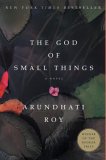Write your own review!
Eeek.
I just read this book for my Global Lit class, and I must say that it is one of the finer pieces of literature I've read recently. Especially for one writing in one's second tongue, Roy's ease with the English language and her boldly innovative style are impressive. She really seems to revel in her mastery of the language. The plot was difficult to catch on to at first, and I was quite confused for a bit, but by the end the stray bits and pieces fit together perfectly. The coming together of the novel as a whole at the end is truly beautiful. This book is definitely one that I would recommend to any reader - looking simply for a good read or for a deeply profound exploration of Indian society and the nature of man.
Jose V
“The God of Small Things” is a novel that should not be gauged by the standards set by the 20th Century English novelists. Because, it is a 21st Century novel, that just happened to be written in the 20th Century. And, though written in English, it is essentially an ‘Indian’ novel. It is not only the setting, but also the ideology, the theme, characters, the narrative technique, and most of all, the ‘feeling’, that is Indian - or to be more precise, Keralan. It is a daring attempt at bringing the regional life of India to the forefront. Thus, while it remains a postcolonial novel, it is also a novel that gives attention to the marginalized sects, and tries to contrast it with the ruling centre of the nation itself. However, it is better to read the book without reference to the non-fiction writings of the author that came out afterwards, on various topics like globalization, Narmada dam, nuclear bombs, war for peace, and the like. Because “The God of Small Things” is just a simple story about an unequal world seen through the eyes of the twins Rahel and Estha - who are the babes lost in the woods of adult justice. Ms.Roy does not try to bring in her personal convictions on social issues (which she does in her non-fiction writings) in this novel. It is not fair to judge the book by its language either. Because it is a new ‘english’; and not the English that we find in Victorian novels. But it is by no means an english that is incomprehensible. In fact, it is an english that could be ‘felt’, as it is true to life and comes straight from strong emotions. Standard English syntax will never be sufficient enough to express the glee, the agony, the confusion, and the rebellion of the twins who live the Aymanam life to the full. How can they escape the language and expressions of the native people, of themselves? And Arundhati Roy has succeeded in blending the two languages, and using her english as innovatively as possible - experimenting with its syntactical order, but never compromising on the semantic level. However, it would be a nice idea to provide a key to the Indian words. I have come across a lot of non-Indian readers who think that the plot is ‘strange’ and set in an ‘unfamiliar’ world. True. It is strange and unfamiliar to non-Indians. But what do they expect in a book that belongs to a nation and culture that they do not know well enough to consider it ‘normal’ and ‘familiar’? Well, I am an Indian, and I have read a number of books (American, British, Canadian, Australian, South African) which obviously do not have much in common with the life and culture that I have. And there is always the difficulty to follow regional expressions, variants of the language, slang and all. But I guess it won’t be fair if I judge the books merely on those aspects. Unfamiliar things become familiar once you try to open your mind and understand them, I believe.
If you really care for a truly rewarding reading experience, if you like to ponder over what you read, if you are ready to know the unknown, if you are an unprejudiced reader who does not try to ‘judge’ an author by her/his novels, if you know the difference between fiction and non-fiction, if you need to understand how myth, history and life are intertwined in the Indian consciousness, just try reading “The God of Small Things.”
ali abbas
man the book is kool
a must read. i attended her lecture at the kanaird collage yesterday and have never seen such great women working for the destitute of the india... her stand at the narmada dam issue is outstanding and she wages war against the nuclearisation of the subcontinent. way to go ....man.
ali shah
Arundhatti's book set in kerala is an exceptional fiction based on the irny and intensity of caste system in india. she is the most inspiring and audacious women ever. the 5 2'' and raised check-boned lady makes a great debut.
elani
amazing!
Water Lily
<< The most poetic book I ever read. >>
Those are someone else's words, but I had to repeat them cause they are the truth.
A book that I'll definitely have in my home library and also wholeheartedly recomend for reading.
catherine longmate
Challenging, fascinating, totally absorbing. On the all time favourites list. I can't wait to read it again.
Katie
Overall really good read, incorporated many interesting ideas and themes
